South Sudan Joint Response: reaching more people while saving time and money
The impact of multiple crises in South Sudan, including armed conflict, disease outbreak and economic hardship, continues in 2020. Since the start of the internal conflict between the government and opposition forces in 2013, some 2.3 million people have been displaced, mostly children. About seven million people – more than half of the country’s population – need humanitarian assistance, with almost five million people facing food insecurity.
In response to the humanitarian situation in South Sudan, 7 Dutch NGOs, in collaboration with the Dutch Ministry of Foreign Affairs, have worked together in South Sudan since 2015. In 2019, the Dutch Relief Alliance partners were Save the Children, Tearfund, CARE, Plan, War Child Holland, Dorcas and Help a Child (Red een Kind). Together with their local implementing partners CEDS, Women Development Group, ACROSS, UNIDOR, HDC, WOCO and Mary Help Association, they joined forces to provide a total of 106.500 people in different parts of South Sudan, namely in Aweil East, Koch, Malakal, Fashoda, Wau and Pibor, with FSL (Food Security and Livelihoods), WASH, Multi-Purpose Cash and Protection Support.
The South Sudan Joint Response (SSJR) Program gives value for money as more beneficiaries are reached with different services and increases the quality and impact of our interventions as it makes use of partners’ specific expertise and experience.
Beneficiaries from Wau and Aweil East tell their story
In the summer of 2019, we visited two SSJR locations: Wau and Jur River County in Western Bahr El Ghazal State, and Aweil East County in Northern Bahr El Ghazal State. Here, we portrayed some beneficiaries of our Joint Response.
Aweil East (Northern Bahr El Ghazal)
In Aweil East, the main driver of food insecurity is low productivity as a result of climate change and influx of populations stretching resources. The majority of the existing water points are damaged, and repeated displacements, economic crisis and food insecurity have contributed to a breakdown of structures, affecting the fragile protective environment for children and causing persisting protection concerns.
Save the Children and Tearfund, together with local partner Center for Emergency and Development Support (CEDS), work together in Aweil East to implement an integrated FSL, WASH and Protection response. A total of 28.000 beneficiaries across two communities are receiving inputs, such as seeds and farming tools and fishing kits, to protect and rebuild their livelihood. They also gain access to safe water through the rehabilitation of hand pumps and installation of latrines. Additionally, vulnerable children and their families are provided with psychosocial support activities.
Angelina Awut Athiang (43)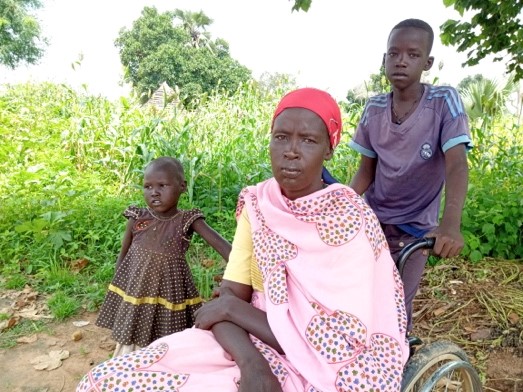
“My name is Angelina, and I have six children. I was fine before my sixth child. I used to cultivate and work hard to feed and support my family. But five years ago, when I was pregnant with my last-born, my hands and legs started to paralyze. I don’t know what it is. I tried to seek for medical help but it continued after giving birth to my child. When my husband realized that I’m vulnerable, he left me. Life has become difficult for my children and me. My 14-year-old boy now feeds us. He goes to the market every morning to push a wheelbarrow and when he’s given money, he buys bread for us.
Now, the people from the SSJR Project are supporting my children and me. They are giving me 6,400 SSP (about € 44) – money that is helping me to gain hope. I only use the money to buy basic lifesaving items like food, medicine and clothes for my children and me. I’m happy at the moment, because I’m able to forget my suffering and support my family. But what I’m worried of is that, if I have no continuous help, I will definitely be nowhere in life.”
Marrie Awok (56) 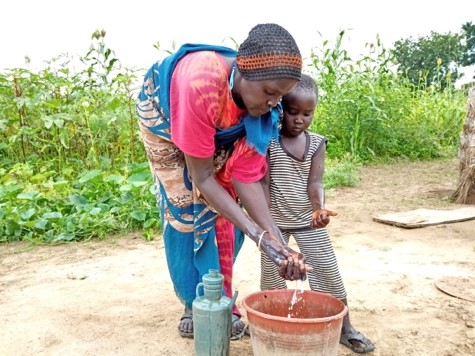
“My name is Marrie Awok. I have 10 children and 7 other relatives who live with me. The father of the children stays far away, in Aweil town. Only two of my children go to school. The rest stay at home because I can’t pay the tuition fees to send them all to school. We are farmers, but I have not enough energy to cultivate and feed the family. We only have 3 goats, which is not enough to sell and feed or support my family.
We used to drink from a stagnant well, which is about an hour walk. And when you reached it, you had to wait for 2 to 3 hours before getting the -dirty- water. We have had a lot of cases of diarrhea because children drank dirty water. I even lost two of my children after suffering from diarrhea. I don’t know what happened to them.”
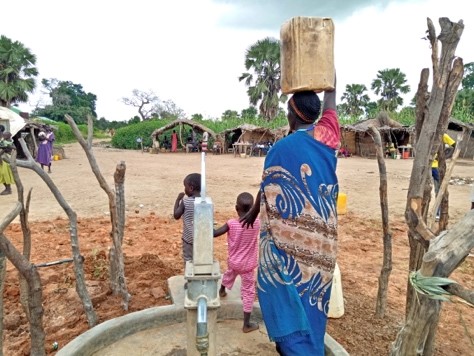
“This year, the people from the SSJR Project renovated an old borehole just within the area. Now, we can access clean water nearby our village. As a result, the rate of diarrhea among my children has reduced. And when you go fetch water, there is no delay. We have plenty of water at home.
They also constructed a latrine and told us how to use it. They told us how to wash hands after visiting the latrine, after cleaning a child’s bottom and before cooking, eating and preparing food. We are happy that we no longer drink from a stagnant well and that we now know how to protect children from dirt and wash their hands as instructed. Especially, if a child visits the latrine, we instruct them to wash their hands afterwards. Before we didn’t know.”
William Mou (65)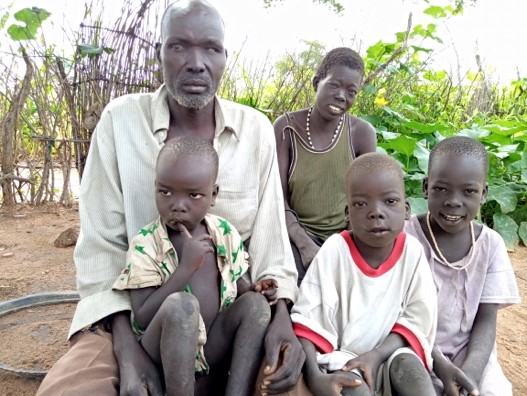
“My wife and I have three children. As I lost my sight sometime back, I’m unable to work to support my children. We don’t have livestock like other people and my wife is unable to get enough food for us, so we sometimes depend on other people to survive. You can even see my children have no good clothes.
During rainy season, floods destroy our house and we have to sleep outside. Last year, the people from the SSJR Project came and gave me some materials. They first give me a carpet to roof my leaking house. They then gave my family and me items like soap, a mosquito net and blankets. I also receive 7,000 SSP (about € 48) every 3 months to support my family. I use it to buy food and medicine for my children.
I’m worried about the future of my children. My last-born is 4 years now and none of my children goes to school although the school is just near us, because I have nothing for them to go to school. I’m also worried about the food scarcity, the floods and our place to stay. The land I stay in now is not my, but other people’s property. For now though, I’m happy because I’m able to accommodate myself in the house they renovated for us. I’m also happy of the support given to me and my family.”
Awut Chan Ngor (38) 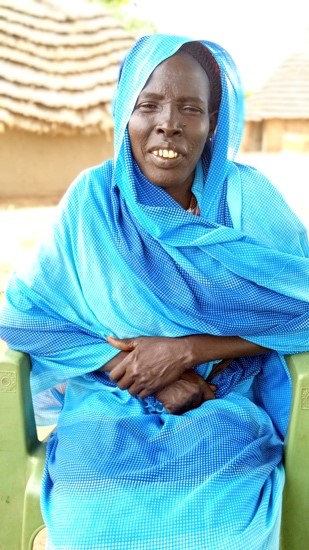
“My husband doesn’t stay here, so I’m the only breadwinner at home. I have six children. Five of them are enrolled in school, but I have difficulties to pay for school fees and medical bills and to buy basic needs for my children. Two years ago, I started a small business with only 10.5 kg of groundnut, which is equivalent to 660 SSP (about € 5). I didn’t know how to save the little I had for the business. I did spend all the money I earned and the business was about to collapse.
Earlier this year, the people from the SSJR Project came and said they wanted to assist women who are doing their own business. I then introduced my small business to them. After that, they trained me on how to do small-scale business and how to save money within the same business.”
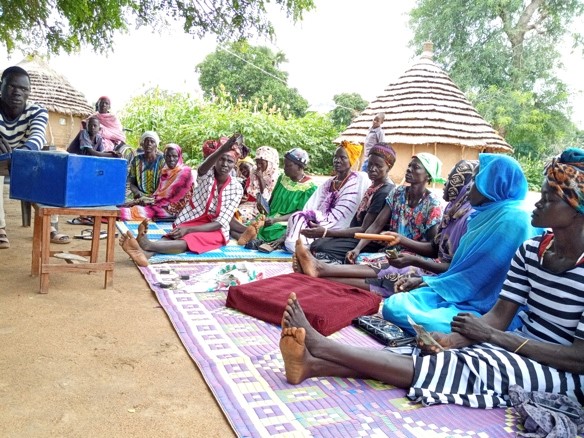
“After the training, they organized us in groups to save money together. We then formed a group while using the skills and knowledge they trained us on how to do our business. Since we’ve started, we are doing well. Every week I save 1000 SSP (about € 7) for the group and 1000 SSP for my family and my business is expanding. If any person comes to borrow money from me, I’m able to lend him or her money. If they ask for 500 SSP or less, I can even pick it from my pocket and give it. But if they want 1000 SSP or more, I borrow it from our savings group account, which they will refund later. I have even become popular within the saving initiative.
I thank these people for bringing in this project. But we need more training and support because we still have a lot of people here in need of help to save their lives, and especially those of their children.”
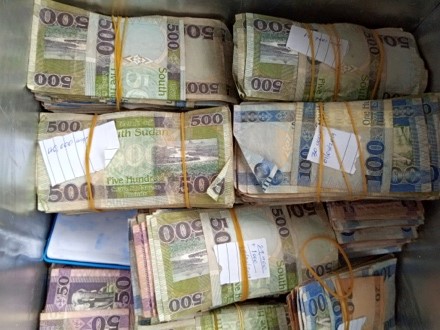
“I started saving in May and will continue to save 16,000 SSP (about € 111) for the period of nine months. By the end of nine months, I will receive about 150,000 SSP (about € 1038) from my savings. I will use the money to continue paying my children’s tuition fees and to open a new shop.mI am confident about the saving business and will continue to save and mobilize other small scale business owners to join the initiative.”
*SSP= South Sudanese Pounds
Wau and Jur River County (Western Bahr El Ghazal)
The lasting effects of the outbreak of conflict in Jur River and Wau County in April 2017 have continued to negative impact on Food Security and Livelihoods, access to WASH services and Protection in Wau and Jur River counties. As a response, Dorcas and Help a Child (Red een Kind) have worked the last two years across seven communities to strengthen their livelihoods with agricultural inputs, income generating activities and livestock. The same people also have received access to safe and clean water through the rehabilitation and/or drilling of hand pumps and latrines in their communities. In addition, Child Friendly Spaces have been set up in the same communities as well, to ensure that children can play together and develop themselves in a safe environment.
Peter Chol Chol (37) 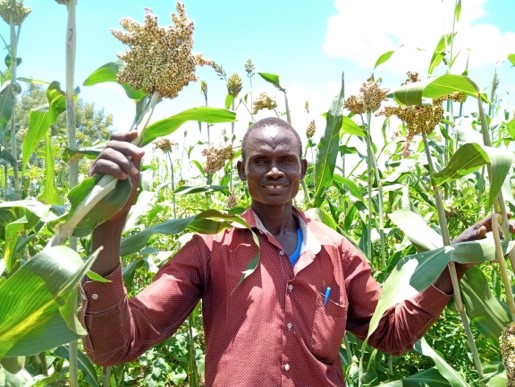
“When I had to flee my home town Bentiu, I only rescued my family’s lives. My animals and all my possessions I left behind. I used to be a businessman, but I lost everything I owned. My family and I resettled in Wau, where we were just given a piece of land to settle, but there was no clean water, food, health facility or school.
I kept on trying my best to labor and support my family. I cut trees and grass and sold them to earn a leaving, until last year when the people from the SSJR project came to support us. They rehabilitated our water point and also taught people how to use it and how to use water at home. They constructed a Child Friendly Space where children can play together and get used to each other. The most interesting is that children in this village, including mine, have learned how to live together, eat together and play together. They used to hate each other thinking others are the enemy.”
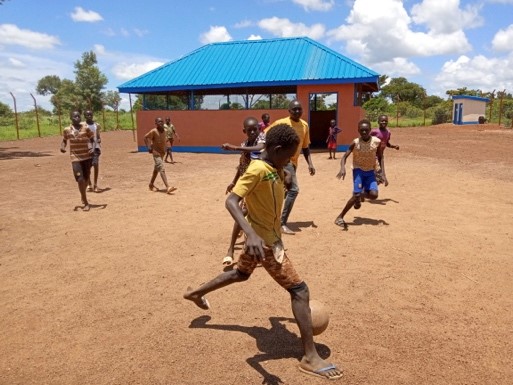
“For me personally, they first gave me 2 goats that helped me to provide milk to my 5 children. I’m really happy that the goats have reduced my stress of looking for children’s milk. The children used to cry a lot but now they are doing better. In the meantime, my goats have increased to 4. This year, they gave us an ox plough, tools and seeds and trained us to grow crops. I used the seeds and tools to plant my own sorghum. I’m also a member of a farmer group and we used the ox plough to plant groundnut for everyone’s benefit because we don’t have enough land for each of us to plant differently since we are displaced people.
At least my family’s life has a difference compared to when we had no help. But the challenge is that there are 725 households in this area, all IDPs who need help, but just about 250 households are benefiting from this help.”
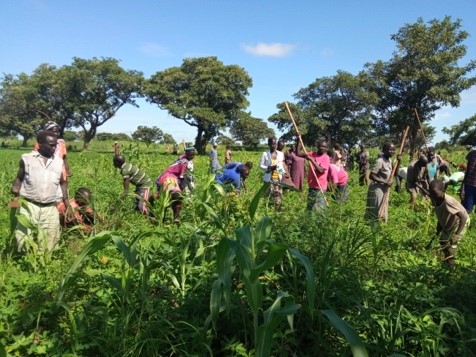
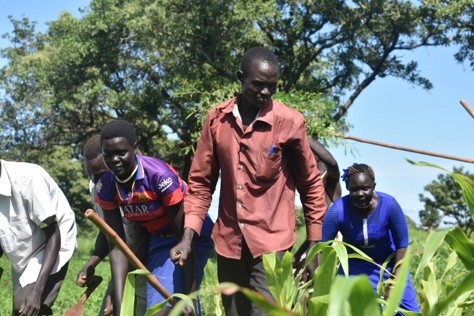
Amer Akon (30)
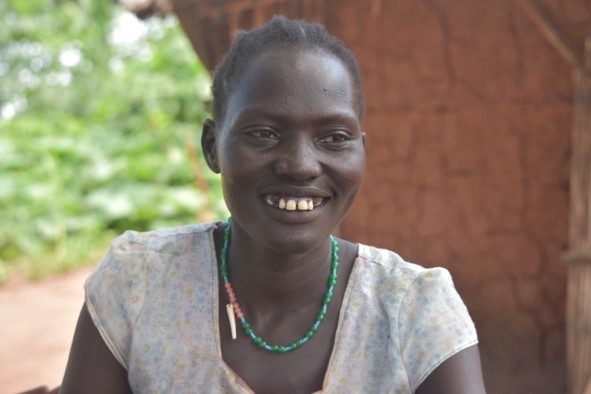
“My mum, my under aged children and I were displaced in the 2013 Bentiu fighting. We walked for about one month before reaching Wau. It was very difficult for us. We really suffered from hunger and tiredness and were in constant fear for attacks. At night we slept in the bush.
When I settled here, life continued to worsen since we came with nothing. We left all our animals and belongings in Bentiu, so we had nothing to start a new life. Like many women, I don’t know the whereabouts of my husband. When we fled, we left him in Bentiu. In this area most of the women live just like me. Some lost their husbands and others don’t know where their husbands are. It’s a tragedy for us.
I fetched firewood and sold them to buy food so that we could survive. When the people from the SSJR project came last year, they selected me to be part of the project and I was given two goats. Now I have 5 goats.”
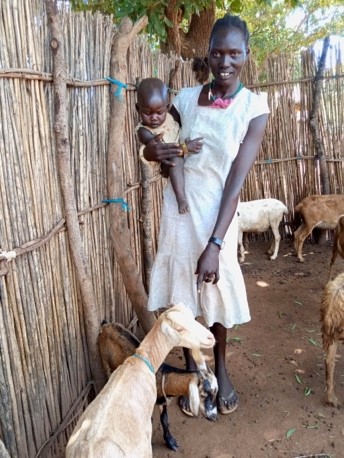
“Since we were traumatized, the children and I were given psychosocial support to forget what had happened. Now my children can play freely with others at home. I’m also a beneficiary of seeds, tools and training conducted to grow crops. Last year, I cultivated and harvested 7 bags of groundnut. I sold them to buy clothes and basic needs for our family. As per now, I have opened a small business. I sell tea and bread to sustain a living with my family. This year, my mother is also a beneficiary of seeds, tools and training. At the end of this year, we’ll be able to sell her products to expand our business and support our family.
I’m just worried about the education and health facilities for the children and us. There is no school and no health center for us here… I’m also worried about the future if there is no continued support.”
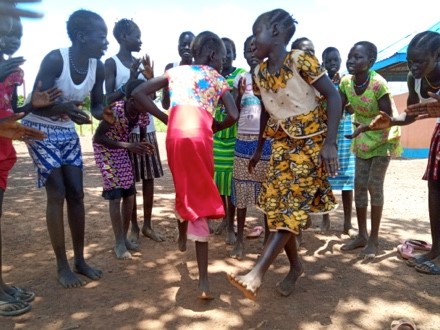
Rebecca Diing Mawiel (40)
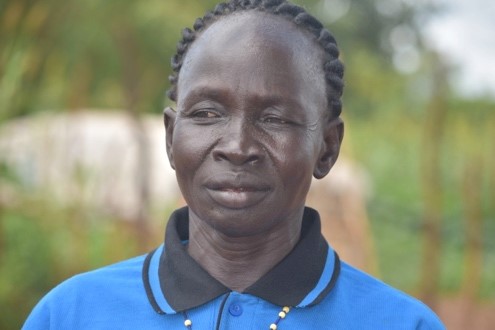
“When we came here, we fetched water from the Open River and stagnant well. This water is dirty, with worms and crystals inside, just dark or colored. Besides, fetching water was only possible during the rainy season; during dry season, water was scarce and it took us about 5 hours to get water for use at home. And since the water points were far away, it was difficult for my daughters to help me fetch water. They feared criminal activities such as raping.
At many times, my family members and I have stomach problems like diarrhea because of drinking or using dirty water. And in their search for water, two children have even drowned in the river.”
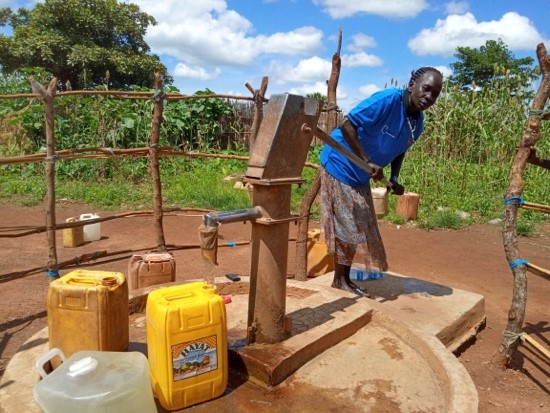
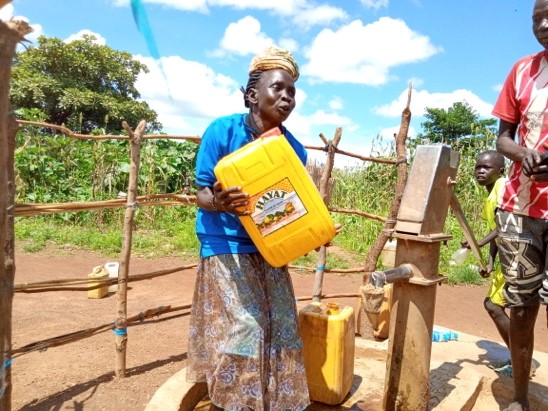
“When the people from the SSJR project came, they renovated our broken borehole. We, women and our daughters, now feel free from fear of rape because we now have water close to our home. It’s about a 5 minute walk, so no more long distance walking.
Additionally, we learned how to keep water clean. We were trained on sanitation and hygiene. When we fetch water from Open River or well, we were told to boil the water, filter it and then add chlorine before using it. I was also trained on how to manage the water point (borehole) so that it doesn’t quickly break; and if it breaks we immediately report so that it’s being repaired. I thank the people who helped us to get clean water and protect our family from deadly diseases.”
13 February 2020
Are you inspired?
Read the next story or contact us to get to know more about making an impact together.